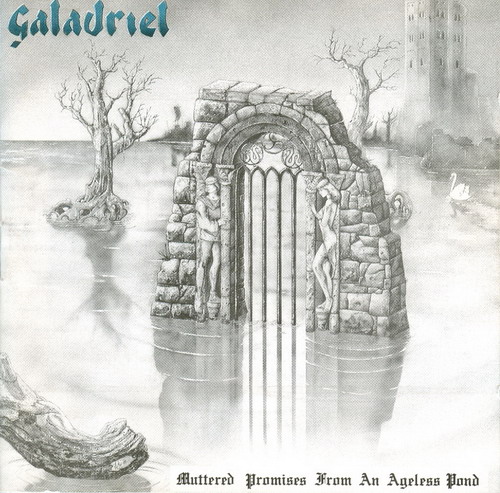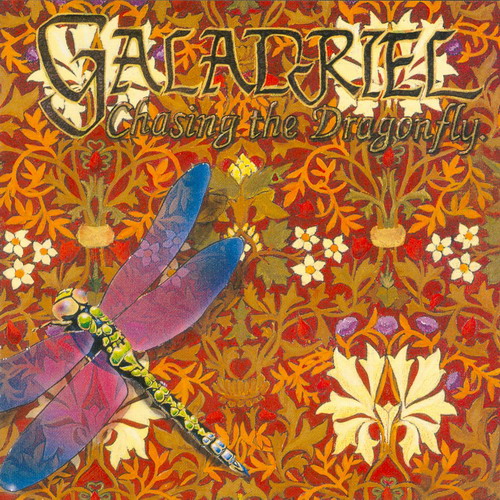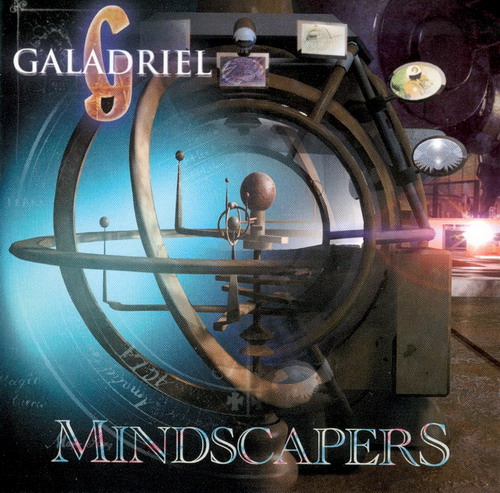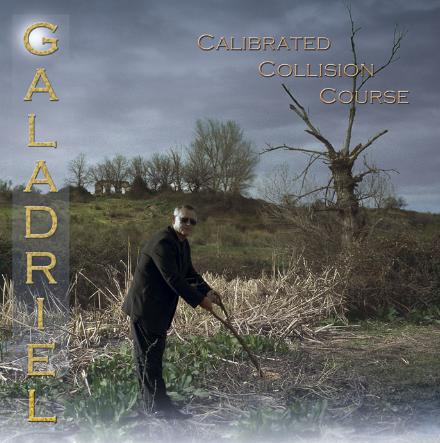Progarchives.com has always (since 2002) relied on banners ads to cover web hosting fees and all.
Please consider supporting us by giving monthly PayPal donations and help keep PA fast-loading and ad-free forever.
/PAlogo_v2.gif) |
|
Post Reply 
|
| Author | |
toroddfuglesteg 
Forum Senior Member 

Retired Joined: March 04 2008 Location: Retirement Home Status: Offline Points: 3658 |
 Topic: Galadriel Topic: GaladrielPosted: February 20 2011 at 11:08 |
|
Sophisticated Neo Prog band from Spain, with vocals in English and Spanish, pretty much on the Jon Anderson style, but the music is not YES like. GALADRIEL's sound is soft and very well elaborated with dynamic changes and nice accoustic passages. Their music is more in the vein of the classic Italian progressive sound (like early PFM, for example). "Chasing the Dragonfly", the 2nd album from this Spanish band, combines ethnic flavors with a very mundane neo prog style for an overall sound that is unique. .....so said the biography. I got in touch with band member Jesus Filardi for the full story. #######################################################
When,
where and by whom was Galadriel started ? Did any of you, past and
present Galadriel members, play in any other bands before joining up
in Galadriel ? Why did you choose that name ?
Galadriel
didn’t kick off officially until summer 1986 in Madrid
(Spain). Before that we all had small bands
trying out whatever skills and perspectives we had at that time.
Young people, quite naïve and immature. Just like anybody else
I guess. Guitarist Manolo Pancorbo
and I (Jesús Filardi), along with some other school friends, came up
with “The Magic of Fire” to name our first attempt at a
prog.project. This band never recorded anything but was
definitely a milestone to understand what future Galadriel would be
about. I simultaneously sang in a band called Algor. That
was early ’83 and ’84. I was merely stepping in for their
singer tied up in his one year military service. Some members
from Algor have played in Galadriel over the years and some have even
collaborated on recent recording sessions. Anyway, back in ’85
after I finished with Algor, Manolo Pancorbo
and I teamed up with a keyboardist called David Aladro, drummer Oscar
Pérez and bassist Pablo Molina. They had a band called
“Dantalion”. Finally, guitarist Manolo Macía
came into the picture with his progressive rock craving as well and
we hit the road. As to the term Galadriel, back then Tolkien’s
books weren’t that well known compared to today and I had grown up
as a big “Lord of the Rings” fan so the name just seemed to click
graciously.
 Over
to your albums. Your debut
album was Muttered Promises From An Ageless Pond from 1988. Please
tell us more about this album.
“Muttered…”
was our first real shot at making an album. Before that we had
recorded a demo tape in ’86 called “Unfolded Visions of Fire and
Steel”. 3 songs were on it: “Those who forge Steel”,
“Nunca de Noche” and “Virginal”. We also managed to
slip in another one of our tracks “Summit”
(’87) on to a
compilation album called “Exposure”, but “Muttered…” was
our first big step in the studio. Or should I say studios.
We lacked any sort of serious funding at the time so we stepped into
different studios, whenever and wherever we found a decent deal.
Drummer Oscar Perez didn’t make it to that stage though.
Instead, brazilian drummer/percussionist Cidon Trindade found a
direct path to our hearts through a very unique approach to the world
of rhythm. We were all very attracted to somebody who could
play a good set of drums but also to somebody who found things to do
in the more quiet sections. To put it short let’s just say
Cidon marvellously enhanced the more ambient side of our music.
However, putting a collection of songs together for the album wasn’t
that easy. There were two different styles clashing together
constantly: on one side there were
some of us
more closer to bands like Genesis or Yes and then there were other
members who were very fond of E,L & P. I tried to pick out
an equal amount of songs from both worlds so nobody got too pissed
off. Balance was in my mind while trying to sort out the
differences. Like most bands starting out on their first album,
this music is probably for the more die hard fans. It was way
too influenced by bands from the 70’s. There was a long way
to go; to carve out a personal sound is no easy task. Half way
through the recording of the album we lost Pablo Molina. We
carried on without him. There was no stopping us. We had
a huge amount of determination. We even played live several
times Manolo Macia
dishing out bass and
guitar on a double-neck contraption we bought for this purpose.
But in 1988 Manolo Macia
also abandoned ship
and we found new replacements like Barcelona
based Alfredo
G.Demestres (keyboards/gtr.) and bassist Marcos Do Santos, yet
another brazilian musician.  Your
second album was Chasing the Dragonfly from 1992. Please tell us more
about this album.
“Chasing
the Dragonfly” was about taking musical risks. Classic
prog.rock consumers were caught a bit off-guard with this album I
might say. They were expecting more of what we had
released on “Muttered…”. But we were extremely proud as
to where we were heading; a more personal direction, offering our own
musical blend. We mixed ingredients in a different way.
Probably lost some fans on the way but the results were more
promising, in my opinion that is. Getting things into
perspective I guess I should start off mentioning the loss of
keyboardist David Aladro. He left us in 1990.
From the very beginning we knew it was going to be a hell of a
challenge for us in the composing department but we were determined
to stretch out and make ends
meet. We got better results out of our rehearsals, more
discipline as to arrangements. We dived into computers and MIDI
and marvelled at how technology was growing more
than ever. A pre- production process
began with keyboardist Javier Quero.
This step was essential at structuring the whole plan. Alfredo
G.Demestres would occasionally come over from Barcelona and
inspire us all. After a first frustrating
two day experience recording we decided to try a better studio.
We took on Red Led, a state of the art studio in Madrid fully
equipped for such a crazy and demanding
project. By then drummer Cidon Tridade had brought in a
fantastic piano and keyboard player by name of Santi Pérez who
helped us finish off some tracks and co-produce the album with us.
Production was something we hadn’t paid much attention to in the
past. With this recording we started working on other levels we
didn’t even have a clue to. But this was also going to be a
collaboration album with many other
invited guests, too long a list to remember off by heart at this
moment I’m afraid. Each and every one of them enriched our
songs tremendously beyond our
wildest expectations. We were damned satisfied at that time but
hey,…it was only our second album.
 Your
third album was Mindscapers from 1997. Please tell us more about this
album.
By
the end of October ’93 a major crisis hit us. Band dedication
was clearly interfering too much with our private lives.
Everybody had one reason or another to stop. Down to one band
member, I began writing new music and searching for new people.
From that period I remember a lot of people coming and going. I
interviewed a great deal of musicians telling them about this unique
opportunity to take on a real challenge, but it was extremely hard to
get anybody interested. Finally, things started to brighten up
with bassist Jose Bautista.
He has definitely played a key role in Galadriel’s history.
Jose and I started working on the ideas I had been developing on my
own. We got along very well. Each session with him was so
stimulating. He’s also a computer wizard and boy can that
come in handy nowadays. A young, new guitarist by the name of
Nacho Serrano joined us eventually. He proved to be one
serious, committed partner in crime. Then came Alejandro Román
on keyboards, drummer Renato Di Prinzio and Tommy Caggiani on
percussion. This line-up was responsible for the1994-1997
period. We gigged, performing “Mindscapers” live and
eventually made it to the studio. We visited “Red Led” once
again. I went through several deja-vu’s mixing different
moments and episodes with past and present band members. It was
a weird trip, full of up’s and downs as usual but in the outcome a
hell of an experience. After recording this third album I had
the feeling I was no longer in the back of the car wondering where we
were heading. I had jumped into the front seat. I
deliberately steered the band into a more contemporary territory,
trying to avoid as many prog. clichés as possible. I’m sure
there are still traces of our influences but as somebody put it to me
once, we had come a long way…
And
then there was a ten years long break. What happened and what were
you up to during those years ?
Lots
of things happened. On one hand some band members got restless
with how decisions were taken regarding compositional activity.
Others insisted on not releasing “Mindscapers” with Musea and
others simply had to make too big an effort to rehearse. Tommy
Caggiani for instance was living in Rome
at that time and although very happy with being a
permanent band member it was stressing us all out a bit. In
order to understand how things ended up we have to go back to the
first months of my relationship with Jose. At some point during
1995 Jose bought himself a synthesiser and started writing his own
music while we were structuring “Mindscapers”. He threw a
cassette tape at me several months later asking me to consider the
possibility of using some of his material for “Mindscapers”.
I must say I was very impressed. The music had a strong
personality to it. I felt it as a whole, and as a piece of its
own I suggested we could use it for our fourth CD in a near future.
Most of the other band members didn’t like Jose’s ideas that
much. I think they just didn’t listen to them properly.
Anyway, that was the last straw for most of them as Jose and I
continued as a team. Proper replacements were never to be
found. We lost a lot of time calling new people. On the
other hand my private life was taking on new twists and turns.
My pregnant wife and I bought a new house where I was planning on
building our own studio. This way I wouldn’t have to spend so
much time away from home while rehearsing and we could really cut
down our recording expenses. A few months before moving in, our
first baby girl Sara was born with a severe brain malformation.
The impact it had on us was devastating. It was almost
impossible to write any music at all during the 2 years she lived
with us. This is actually the first time I’ve been able to
write down this chapter of my life. Before passing away in
dec.2001 our second baby girl Veronica was born. Ronnie luckily
came to this world like any other healthy baby. Construction on
the studio took place during 2002. It took us a whole year to
finally get things into full speed. Simultaneously we tried to
make a comeback live (2003-2004) with some new band members and a
promising manager but things didn’t come out as we expected.
More precious time down the drain… 
Your
fourth and newest album was Calibrated Collision Course from 2008.
Please tell us more about this album.
CCC
was about taking even more musical risks than ever. When I
listened to the basic demo versions Jose had handed to me in ’95, I
remember thinking how much of it did not relate to classic prog. at
all. I even thought it was too
risky. But then I realised what prog. is really all about.
It’s about going forward and leaving the obvious behind, right?
No matter what or who, right? Oh, by the way, this is how I
came up with the title for the CD. So we went down that path
and came up with a very personal piece of music. After
structuring the songs on the computer Jose and I looked into who
would actually record this for us. We had a drummer from our
last period called Javier
Iñigo who was willing to record his bit. As
to the guitars, I was dying to ask french musician and friend Jean
Pascal Boffo to lend a helping hand. I’ve been a big fan of
his work from his very first recordings on the Musea label. We
had even made an attempt to have him produce our second CD but it
never happened. This time however, things clicked. Nacho
Serrano offered himself up to record a couple of tracks, so the
guitars would be sort of 60% for Mr.Boffo and 40% Nacho. But a
guy called Javier de las Heras unexpectedly
stumbled across our path and did Nacho’s parts. Javier
was supposed to play with us on a small tour we
were planning so it was just natural he played on some
songs. Still another guitarist was called in to fill in some
last minute takes: Chema Arribas
from my Algor period. We also dragged in
once again Cuban-American keyboardist Santi Pérez who had already
played on “Chasing…”, as well as a guy called Miguel Afonso
from the Canary Islands who played
accordion. And last but not least, Mr.Andy Sears
who surprisingly lived only 30kms.away from my
place also fell into the Galadriel net.
For years I had been wishing to properly tackle some decent backing
vocals. Andy put the star on the Christmas tree. We were
prouder than ever at how things had finally turned out after such a
long time working our way around this CD. This time we took yet
another step forward in terms of production: Simon Heyworth mastered
our songs at his studio in the south of England. Jose and I
spent a friendly and very professional week-end with him learning a
bit more of what sound is all about. An unforgettable
experience.
How
is the creative processes in your band from coming up with an idea to
it's being recorded ?
In
the old days, we all used to jam a lot more together. Nowadays
it’s either Jose or I who bring in a track and we work around it
directly in the studio. Shaping definitely takes its time
though. You may even come up with several different approaches
to one song. This happened for instance on CCC’s “Leap of
Faith”. We had three different versions to choose from.
Then you need some more time to see if it still stands up after
you’ve wrestled with it. To me it’s something special.
It’s like a therapy to life itself. Playing with the chords
and the melodies is like disconnecting yourself from everything
else. Time literally flies when I sit down at the piano and
fool around with a synthesizer. The possibilities of where a
song can go are endless. Sorting everything out can de-stress
and take you to another dimension. It even makes me forget
about my mortgage payments man (!). Having our own studio makes
things easier to visualize. Now we record at the same time we
compose and arrange. Modern technology has really made a huge
difference compared to years back when it was so expensive to get
into a studio. Composing is one of my favourite moments, very
intimate. Some times I miss having several composers in a band
like when we first started out. It was very enjoyable but also
extremely hard to make definite decisions. Having less
composers in the band today makes it easier to handle. For
those of us unknown with your music; how would you describe you music
and which bands would you compare yourself with ?
I’d
say Galadriel’s music is hard to pigeon-hole in. I like to
think that our first musical references are thinning out as time goes
by. We were influenced by early Genesis and Yes patterns but we
have clearly evolved from that stage. This is the main issue in
any band’s career. If you make the same music over and over
again, you’ll eventually tire people out. I think we’ve
taken and still are taking enough musical risks to make our own
personal brew. Each new CD gets better in terms of maturity on
all levels. I wonder what the future holds for us. I just
can’t wait to find out!
What
is the latest update and your plans for this year and beyond ?
We’re
taking a small rest after releasing and promoting our last CD
“Calibrated Collision Course”. A lot of work went into the
last stages of the recording, mixing and mastering. Then we
went on a small mini-tour that demanded an enormous amount of energy
and money from us. By the end of that we were totally
exhausted, wasted. However, music is inside us and we can never
really stop completely. I’m writing some new music for a
future Galadriel release and I’m also working on a side project
with one of our first Galadriel guitarists: Manoel Macia. We’re
planning on releasing a CD together. We’ve kept in touch
throughout the years ever since he left the band in ’88. Our
relationship has always been a strong one and I suppose it was just a
matter of time until we got back together again. We have a
personal musical vibe that bonds us in a special way. I’m
having a great time with the first new tracks that are hatching
already.
To
wrap up this interview, is there anything you want to add to this
interview ?
Sure!
For those of you who do not know what the Galadriel dream is all
about, head for our homepage and check out what this band can offer to your progressive musical
craving.
Thank you to Jesus Filardi for this interview |
|
 |
|
Post Reply 
|
|
| Forum Jump | Forum Permissions  You cannot post new topics in this forum You cannot reply to topics in this forum You cannot delete your posts in this forum You cannot edit your posts in this forum You cannot create polls in this forum You cannot vote in polls in this forum |